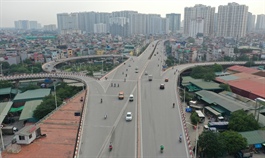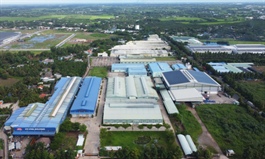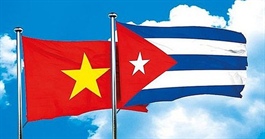Strengthening the private sector can get Vietnam back in the fast lane
Strengthening the private sector can get Vietnam back in the fast lane
Vietnam has distinguished itself in the ranks of emerging market development, surging to middle-income status in just one generation, and cutting its poverty rate from 50 percent in 1990 to 2 percent in 2018.
The country’s robust and sustained economic growth was driven by open trade, sector liberalization, and an export-oriented growth model, in which the private sector played a leading role. With success comes confidence, and Vietnam set a goal of becoming a high-income country by 2045.
Then came Covid-19, though, even before the pandemic, some of the forces fueling Vietnam’s growth had evolved. For example, while technological change is reshaping the country’s manufacturing-led export strategy, other challenges include an aging population, the need for improved regulations, enhanced competition, upgraded infrastructure, skilled workforce, and better access to finance.
During the first wave of Covid-19, Vietnam set a global example by taking swift action to contain the virus. The country was one of the few economies globally to register growth in 2020, and its output was well above its pre-pandemic level by the end of the second quarter of 2021. Yet, containment of the virus led to a significant decline in economic activity and hardship for both families and businesses.
Currently, the country is battling another Covid-19 wave — the highly infectious Delta variant — while risking a setback to Vietnam’s recovery. Moreover, the country’s low vaccination rate along with reduced demand is taking its toll and firms are facing difficulties with renewed restrictions. Small businesses and firms in manufacturing, services, and agriculture continue to experience revenue shocks, which is likely to exacerbate with the ongoing rise in Covid-19 cases.
The question is where does Vietnam go from here?
The pandemic has already strained the government’s budget, as it responded promptly to support impacted businesses and households. Now, amid fiscal constraints, Vietnam needs to accelerate the role of the private sector to support the economy, build resilience, and encourage new markets along with job growth.
In response, the Vietnam Country Private Sector Diagnostic (CPSD) developed by the International Finance Corporation (IFC) and the World Bank lays out the case for timely and concerted reform actions to support an inclusive and sustainable recovery.
The CPSD points out that Vietnam’s need to get back on track — and realize its future ambitions — is ultimately tied to boosting the role of the private sector in the economy, building off the private sector’s frontline success in supporting its development vision. While the country is integrated into labor-intensive manufacturing global value chains (GVCs), it is the world’s second largest smartphone exporter with a vibrant domestic private sector — a growing number of emerging conglomerates operate across East Asia.
While Vietnam grapples with the pandemic, the private sector is already responding to the "new normal." In an example, with the e-commerce sector surging, it is swiftly adopting digital platforms, while encouraging the servicification of manufacturing and the deepening of regional trade integration.
In alignment, developing workforce digital skills, as well as technical and managerial skills, will be vital to help shift Vietnam to an innovation-led growth model. From the growth of knowledge-intensive exports and the service industry to cross-sector automation — the need for a labor force with a range of skills and the means to upskill will be essential.
Also, Vietnam can drive value by supporting equality in its workforce. This is an opportunity for the nation to increase labor productivity by addressing the gender gap in wages and participation – equalizing men and women’s participation in the economy in Vietnam could yield an estimated $40 billion by 2025.
Moreover, green growth is and will continue to be central to the economy’s competitiveness in the coming years. This is especially because the country’s exceptional growth has been accompanied by growing degradation of environmental and natural assets. It is also highly vulnerable to climate change and natural disasters. Recognizing this, Vietnam’s Prime Minister Pham Minh Chinh affirmed the importance of a green recovery and a green economy, providing new markets with an opportunity for green innovations.
To maintain its competitive edge, Vietnam also needs to continue to upgrade its infrastructure. The CPSD particularly highlights two areas: logistics and energy.
The opening of the energy sector to the private sector should especially help respond to the country’s rising demand for power and its urgent need to divert from non-renewable to renewable resources. To meets its targets for renewable energy, the CPSD points out, Vietnam will require a total investment of $23.7 billion by 2030.
To fund its future, the CPSD outlines viable ways in which Vietnam can bridge gaps by boosting access to finance for small and medium enterprises — hard hit by the pandemic — while boosting the availability of long-term finance. This will help private enterprises expand, innovate, and diversify in infrastructure and service sectors.
With significant opportunities for growth and investment, Vietnam is well-positioned to benefit from a growing middle class, increased urbanization, and industrialization. Private sector participation can make a vital difference by supporting the country’s growth in areas such as agribusiness and tourism. Further, spurring the development of a dynamic, diversified, and innovative private sector will be crucial to help Vietnam achieve its sustainable development goals.
The government’s commitment to creating a conducive climate for business has already achieved notable progress, yet there is scope for more, including modernizing regulations, streamlining processes, improving implementation, and accelerating transformation. Going forward, progress in these critical areas will determine Vietnam’s roadmap to becoming a high-income country and emerging as a considerable presence in the region.
*Kyle Kelhofer is International Finance Corporation Country Manager for Vietnam, Cambodia, and Lao PDR; Carolyn Turk is World Bank Country Director for Vietnam.
























